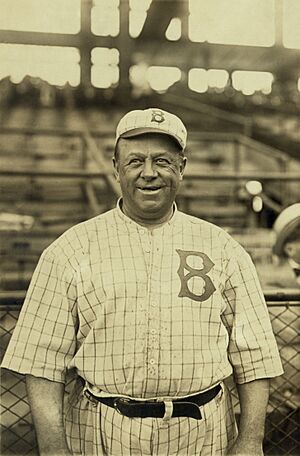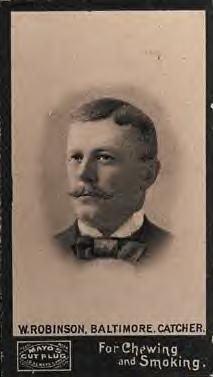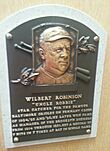Wilbert Robinson facts for kids
Quick facts for kids Wilbert Robinson |
|||
|---|---|---|---|

Robinson in 1916
|
|||
| Catcher / Manager | |||
| Born: June 29, 1864 Bolton, Massachusetts, U.S. |
|||
| Died: August 8, 1934 (aged 70) Atlanta, Georgia, U.S. |
|||
|
|||
| debut | |||
| April 19, 1886, for the Philadelphia Athletics | |||
| Last appearance | |||
| September 29, 1902, for the Baltimore Orioles | |||
| MLB statistics | |||
| Batting average | .273 | ||
| Home runs | 18 | ||
| Runs batted in | 722 | ||
| Managerial record | 1,399–1,398 | ||
| Winning % | .500 | ||
| Teams | |||
As player
As manager
|
|||
| Induction | 1945 | ||
| Vote | Old-Timers Committee | ||
Wilbert Robinson (born June 29, 1864 – died August 8, 1934) was a famous American baseball player and manager. People often called him "Uncle Robbie". He played as a catcher and later became a coach and manager in Major League Baseball (MLB). Robinson played for teams like the Philadelphia Athletics and the Baltimore Orioles. He also managed the Orioles and the Brooklyn Robins. In 1945, he was honored by being put into the Baseball Hall of Fame.
Contents
Early Life and Playing Days
Wilbert Robinson was born in Bolton, Massachusetts. He started playing baseball in a minor league in 1885. By 1886, he joined the big leagues with the Philadelphia Athletics. He played there until 1890. Robinson continued playing in the major leagues until 1902.
He spent a lot of his playing career with two different Baltimore Orioles teams. He played for the first Orioles team from 1890 to 1899. Then, he played for a new Orioles team in 1901 and 1902. This second Orioles team later moved to New York City and became the New York Yankees. Robinson also played one season with the St. Louis Cardinals in 1900.
A Star Catcher
Robinson played 1,316 games as a catcher. This experience helped him a lot when he became a manager. He was a key player for the Orioles team that won three championships in a row from 1894 to 1896. His career batting average was .273. In 1894, he had his best hitting season, batting .353.
He was a very tough catcher. In 1896, he even caught three games in one day, which is called a triple-header! The next day, he caught two more games. Robinson was also the first catcher to always play close behind the batter. Before him, catchers would stand further back if there were fewer than two strikes. A big moment in his career was on June 10, 1892. In that game, he got seven hits and helped his team score 11 runs.
Becoming a Manager
Leading the Baltimore Orioles
After his playing career, Robinson teamed up with another baseball legend, John McGraw. They became partners in the Baltimore Orioles team. This team was part of the new American League (AL) in 1901. McGraw was the player-manager for the Orioles in 1901 and part of 1902. Then, he left to join the New York Giants.
Robinson took over as manager of the Orioles in 1902. He managed the last 83 games of that season. The team had money problems. After the season, the Orioles moved to New York and became the Yankees.
Coaching the New York Giants
McGraw then asked Robinson to be his pitching coach for the Giants. Robinson coached for the Giants from 1903 to 1913. During this time, the Giants won five National League championships and a World Series title in 1905.
After the 1913 World Series, Robinson and McGraw had a big argument. This argument started a disagreement between them that never really went away. Because of this, Robinson left the Giants to manage a team in Brooklyn in 1914.
The Brooklyn Robins Era
In 1914, Wilbert Robinson became the manager of the Brooklyn baseball team in the National League. This team had many nicknames over the years, like Bridegrooms and Superbas. But during Robinson's time as manager, from 1914 to 1931, the team was often called the "Robins" in his honor. He was known as "Uncle Robbie." Sometimes, when the team made a lot of mistakes, people jokingly called them "Uncle Robbie's Daffiness Boys."
The Robins had finished the year before with a record of 65 wins and 84 losses. Robinson helped them improve to 75 wins and 79 losses in his first year. In his second year, 1915, they won 80 games and finished third in the league. They also got a future Hall of Fame pitcher named Rube Marquard.
Winning Pennants
By the middle of the 1916 season, the Robins were playing very well. They won the National League championship (called a pennant) that year. It was Brooklyn's first pennant since 1900. They then played in their first ever World Series against the Boston Red Sox. The Red Sox had future stars like Babe Ruth. Boston won the World Series in five games.
The Robins had a few tough years after that. But in 1920, Robinson led them to a huge improvement. They won 93 games and captured their second pennant in four years! In the World Series, they faced the Cleveland Indians. The Indians won the series five games to two.
Close Calls and Challenges
Robinson continued to manage the Robins for eleven more seasons. Five of those seasons were winning seasons. His best finish was in 1924, when the team came in second place with 92 wins. That year, their star pitcher, Dazzy Vance, had an amazing season. He won the "Triple Crown" for pitchers, leading the league in wins (28), strikeouts (262), and ERA (2.16). The Robins had a great winning streak late in the season and even tied for the league lead a few times. But they just missed winning the pennant by a small amount.
The Robins also had some tough times, finishing lower in the standings for several years. During some of these years, Robinson was both the manager and the team president. He finished his managing career with two fourth-place finishes in 1930 and 1931. His last game was on September 27, 1931, at Ebbets Field. It was fittingly against John McGraw and his New York Giants. Robinson's Robins won that game 12-3.
In his 18 years managing the Robins, Robinson won 1,375 games. He led them to National League championships in 1916 and 1920. These were Brooklyn's only pennants between 1901 and 1940. He was known for being great at helping his pitchers play their best.
Robinson was the manager when Al López started his career as a catcher in 1928. Lopez became a regular player in 1930. Robinson once told Lopez, "Tell that punk he got two hands to catch with! Never mind the fancy stuff." Lopez went on to play more games as a catcher than Robinson, setting a new record in 1945.
Managerial record
| Team | Year | Regular season | Postseason | |||||||
|---|---|---|---|---|---|---|---|---|---|---|
| Games | Won | Lost | Win % | Finish | Won | Lost | Win % | Result | ||
| BAL | 1902 | 81 | 24 | 57 | .296 | 8th in AL | – | – | – | – |
| BAL total | 81 | 24 | 57 | .296 | 0 | 0 | – | |||
| BKN | 1914 | 154 | 75 | 79 | .487 | 5th in NL | – | – | – | – |
| BKN | 1915 | 152 | 80 | 72 | .526 | 3rd in NL | – | – | – | – |
| BKN | 1916 | 154 | 94 | 60 | .610 | 1st in NL | 1 | 4 | .200 | Lost World Series (BOS) |
| BKN | 1917 | 151 | 70 | 81 | .464 | 7th in NL | – | – | – | – |
| BKN | 1918 | 126 | 57 | 69 | .452 | 5th in NL | – | – | – | – |
| BKN | 1919 | 140 | 69 | 71 | .493 | 5th in NL | – | – | – | – |
| BKN | 1920 | 154 | 93 | 61 | .604 | 1st in NL | 2 | 5 | .286 | Lost World Series (CLE) |
| BKN | 1921 | 152 | 77 | 75 | .507 | 5th in NL | – | – | – | – |
| BKN | 1922 | 154 | 76 | 78 | .494 | 6th in NL | – | – | – | – |
| BKN | 1923 | 154 | 76 | 78 | .494 | 6th in NL | – | – | – | – |
| BKN | 1924 | 154 | 92 | 62 | .597 | 2nd in NL | – | – | – | – |
| BKN | 1925 | 153 | 68 | 85 | .444 | 7th in NL | – | – | – | – |
| BKN | 1926 | 153 | 71 | 82 | .464 | 6th in NL | – | – | – | – |
| BKN | 1927 | 153 | 65 | 88 | .425 | 6th in NL | – | – | – | – |
| BKN | 1928 | 153 | 77 | 76 | .503 | 6th in NL | – | – | – | – |
| BKN | 1929 | 153 | 70 | 83 | .458 | 6th in NL | – | – | – | – |
| BKN | 1930 | 154 | 86 | 68 | .558 | 4th in NL | – | – | – | – |
| BKN | 1931 | 152 | 79 | 73 | .520 | 4th in NL | – | – | – | – |
| BKN total | 2,716 | 1375 | 1341 | .506 | 3 | 9 | .250 | |||
| Total | 2,818 | 1399 | 1398 | .500 | 3 | 9 | .250 | |||
Retirement and Final Years
After he stopped managing, Robinson became the president of a minor league baseball team called the Atlanta Crackers. In August 1934, he had a fall in his hotel room. He broke his arm and hurt his head. On August 8, 1934, he passed away in Atlanta, Georgia, at 70 years old. He was buried in Baltimore, near the grave of his old friend and rival, John McGraw.
Family
Wilbert Robinson's brother, Fred Robinson, also played a few games in the major leagues in 1884.
Fun Facts and Legacy
Wilbert Robinson was chosen for the Baseball Hall of Fame in 1945. One reporter described him as a manager who could get amazing results from his players, even if they weren't the most famous stars.
The Grapefruit Incident!
Here's a funny story about "Uncle Robbie." On March 13, 1915, during spring training in Florida, Robinson wanted to try something wild. He decided to catch a baseball dropped from an airplane flying 525 feet above him! He was inspired by a pilot named Ruth Law who used to drop golf balls from her plane onto a nearby golf course.
Ruth Law and the team's trainer were in the plane for the stunt. But somehow, Law forgot the baseball! Instead, she dropped a grapefruit. The grapefruit splattered all over Robinson! It made such a mess that Robinson thought he had lost his eye because of the juice and the red-like splatter. He started screaming. But then his teammates started laughing, and he realized it was just a joke. From that day on, Robinson called airplanes "fruit flies." Legend says this funny event is why spring training baseball is sometimes called the "Grapefruit League."
See also
- List of Major League Baseball career stolen bases leaders
- List of Major League Baseball runs batted in records
- List of Major League Baseball managers by wins
- List of Major League Baseball player-managers
- List of Major League Baseball single-game hits leaders
 | William M. Jackson |
 | Juan E. Gilbert |
 | Neil deGrasse Tyson |



